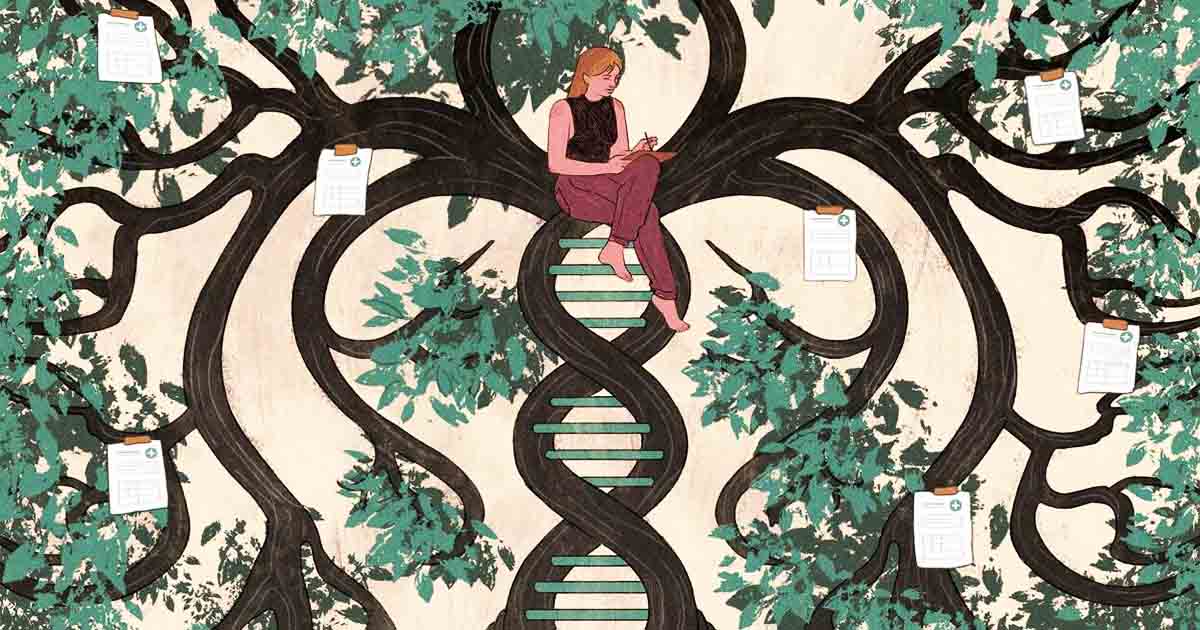Think of the family medical history as a large book that narrates your kin’s health. This record does not only talk about you but also includes your parents, grandparents, and even great-grandparents.
In this article, we will discuss how much impact can be caused by our kids’ health on keeping a family medical history of their relatives’ medical information.
Right from identifying the risk factors of genetics, giving power to decision makers who know, and coming up with individualized healthcare strategies; we look at six main ways through which the health results of our children are affected by our families’ medical histories.
Moreover, we consider five common genetic disorders detectable through family medical records thereby emphasizing early diagnosis, prevention as well as genetic counseling.
What Is A Family Medical History?
A personal and family medical history is a listing of health details about an individual and his or her close relatives. Ordinarily, this encompasses information on illnesses, ailments or any other health matters that have affected their family over many generations.

Such data may contain what kind of diseases were suffered from, the age at which they were diagnosed as well as any pertinent medical treatments or interventions adopted in each case diagnosed with mentioned illness among others.
Family health history becomes crucial because some conditions such as heart disease, diabetes mellitus, and cancer among many others are known to be hereditary.
Individuals can evaluate chances for contracting certain diseases and weigh options on preventive care by studying their family medical history together with help from healthcare providers who will also assist them decide which screening tests should be undertaken based on this knowledge before making decisions about treatment methods.
Read More: Hopelessness In Teens: 5 Best Parenting Tips Help Your Child!
How Family Medical Records Affect Our Children?
Family medical history is a valuable resource for information about inherited conditions and possible future health across several generations.

Here are some important reasons why should we know family health history:
1. Identification of Risk Factors:
According to research, one’s genetic predisposition to different diseases can be determined largely through their family’s medical history.
For instance, a study published in JAMA (Journal of the American Medical Association) observed that people who have had close relatives with cancer were more likely to develop any form of this illness than those without such a history.
Moreover, Circulation Research once published a meta-analysis that disclosed strong associations between heart diseases and family histories; hence we must take into account individual risks based on our families’ medical records.
2. Timeliness of Detection and Prevention:
It is said that the earlier you detect a disease, the better chances there are for recovery or management. This means that knowing your family medical history can help you take action against potential problems before they become serious.
Many studies have proven that if someone has diabetes running in their family, for example, then screening should start much earlier than what would be considered ‘normal’.
Diabetes Care published research showing how individuals with parents diagnosed with type II diabetes were found to be at higher risk themselves even though no symptoms were present yet – this suggests using fasting blood glucose measurements as an early detection method among such population groups might save lives later on down the line.
Also, according to the Journal of Clinical Oncology people who have had relatives affected by cancer must undergo cancer screenings as soon as possible because late detection often leads to negative outcomes.
3. Knowledge for Deciding:
Making decisions based on family medical history implies having comprehensive knowledge about health risks in one’s family.
According to a study in the New England Journal of Medicine, people who know their family history are more likely to take preventive measures like quitting smoking and exercising regularly.
Additionally, genetic counseling has been shown to play an important role in helping people understand what they might be getting into when it comes to having kids or planning for them if there are any hereditary conditions involved with a certain individual’s situation.
4. What It Means To Us:
The idea behind genetic counseling is that it helps shed light on inherited diseases and how they can affect people as well as those around them such as their relatives or future offspring.
According to findings presented in the Journal of Genetic Counseling, patients’ understanding of genetic risk factors tends to increase following sessions with counselors which could lead to better decision-making abilities among these individuals along with an improved mental state overall.
In addition, a systematic review published in the Journal of Medical Genetics points out that genetic counseling serves not only to inform but also empower patients by providing them with insights into their family medical history thus enabling informed choices regarding tests and screenings related thereto
5. Health Care:
In more efficient illness control and prevention, there is a need for personal healthcare techniques which are based on family history.
The Journal of Personalized Medicine has published a survey indicating that personalized risk assessment depending on the hereditary background can be used to determine the most suitable preventive interventions as well as treatment plans.
Furthermore, PLOS Medicine implies in its findings that when electronic health records include family health history, healthcare providers can deliver customized interventions that may lead to better patient outcomes through individualized care plans.
6. Research and Medical Advancements:
Medical research is advanced through family medical information by aiding in coming up with new treatments and ways of preventing diseases.
A lot of genetic variations associated with different illnesses have been found by large-scale genome-wide association studies (GWAS), which require family health history to validate these discoveries and understand gene-environment interactions.
Additionally, initiatives like the Precision Medicine Initiative use data from families’ pasts concerning their well-being to guide wider research into personalized medicine while seeking for improvements in healthcare results across the board over time among various populations.
Essentially, family medical history gives us more than just our medical records; it tells an account of strengths, weaknesses, and optimism. As we keep studying human well-being mysteries, let’s not forget that within our families lie keys necessary for opening healthier days ahead for generations yet unborn tomorrow.
Read More: Technology on Childhood Development: Exploring the Pros and Cons
5 Common Genetic Diseases From Family Medical Records

Based on family medical records, here are five common genetic diseases:
1. Hypertension (high blood pressure):
It is often the case that people who have high blood pressure tend to come from families with the same condition, and this can lead to heart disease, stroke, or other complications of the cardiovascular system.
Lifestyle changes should be made by persons at risk because their family’s medical history may show a trend in raising blood pressure levels over many generations while periodically checking them too.
2. Type 2 Diabetes:
A family background is one of the biggest known factors that contribute towards causing diabetes type II thereby meaning there could be some genetic predisposition to this condition.
This means diabetics need to be aggressive about managing their weight through healthy eating habits as well as physical exercise programs to prevent them from getting type II diabetes.
3. Breast Cancer:
The presence of certain mutations like BRCA1 and BRCA2 genes greatly increases an individual’s chances of getting breast cancer.
It might also point out cases where close relatives in different parts of one’s extended family had suffered from breast cancer thus triggering thoughts about undergoing genetic tests coupled with preventive measures such as regular mammograms plus lifestyle changes.
4. Alzheimer’s Disease:
Although Alzheimer’s disease results from both hereditary and environmental elements, it is possible for physicians to trace back through patient records showing how dementia affected various members of their families over time. These findings will enable patients at risk to take up habits that promote brain health while going for early identification when indicated.
5. Cystic Fibrosis:
Cystic fibrosis mainly affects the respiratory system but can also damage other organs such as the digestive tract among others; therefore individuals should check whether there were any instances of cystic fibrosis recorded among siblings or close kin in their family tree since this would indicate inherited susceptibility.
Couples planning on starting families after having discovered such histories must seek advice about genetics testing services designed specifically for carrier detection if they have been diagnosed with CF or have relatives who were.
Through family medical records, people can recognize these common genetic disorders and take steps to maintain their health before such diseases show up in them.
Early screening is essential because it helps individuals make informed choices about their lifestyles based on the results which may help reduce the risk of getting affected by genetic ailments both to themselves and those around them.
Read More: 10 Subtle Signs Your Family Hates You And How To Deal With Them!
A Word From Mind Family
We must understand that our children’s and descendants’ well-being will be greatly affected as they move through their own intricate family health histories.
At Mind Family, we acknowledge the power behind such tales of resilience mingled with vulnerability while keeping an eye on optimism.
If we adopt our family health histories into our lives, then we allow ourselves the chance to choose wisely, partake in individualized medical care, and contribute towards the development in scientific studies concerning health matters.
Since people are indeed stewards over their families’ medical pasts, then let us treasure these stories and use them for positive change. Indeed there can never be any doubt about this: together we can create healthier futures for our kids and all subsequent generations to come.
Frequently Asked Questions (FAQs)
1. What is family health history?
Family health history is a record of health information about individuals and their close relatives, spanning multiple generations and including details such as diseases, medical conditions, and relevant treatments or interventions.
2. Why is it important to know family health history?
Understanding family health history is crucial for assessing genetic predispositions, identifying potential health risks, and making informed decisions about preventive measures, screenings, and treatment options.
3. What are some common genetic diseases from family medical records?
Common genetic diseases discernible from family medical records include hypertension, type 2 diabetes, breast cancer, Alzheimer’s disease, and cystic fibrosis. These conditions often exhibit familial patterns, indicating a genetic predisposition that can inform proactive healthcare strategies.

















Leave a Reply